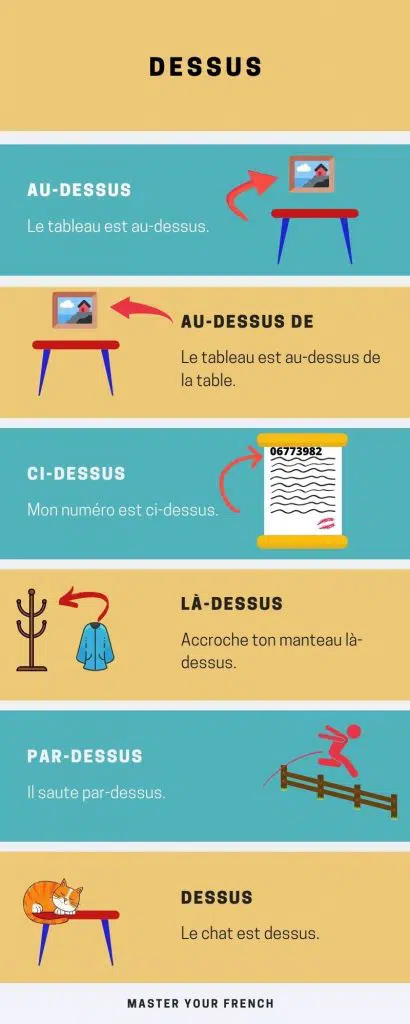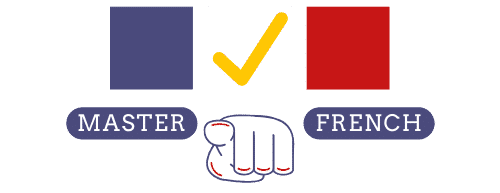How to pronounce Au-dessus in French
Updated: 29 May, 2021 by Mylene in How to Pronounce ▪

Au-dessus in French
Au dessus is an adverb in French that means above in English. You can use the word au-dessus when something has a higher position than something else.
Example:
- Le tableau est au-dessus de la cheminée: the painting is above the fireplace.
- L’avion vole au-dessus des nuages: the plane flies above the clouds.
- Catherine vit au-dessus de mon appartement: Catherine lives above my apartment.
- La lampe est au-dessus de la table: The lamp is above the table.
How to pronounce “Au-dessus”?
In French, the word au-dessus is pronounced /odəsy/. In details:
- /o/ sound: The tongue is back, the mouth is open and the lips are rounded.
- /d/ sound: Place the tip of your tongue on the ridge behind your upper teeth. As you push air out of your mouth, briefly stop it behind your tongue before releasing it. Vibrate your vocal cords as you make this sound.
- /ə/ sound: The tongue is in the central part of the mouth, the mouth is more relaxed and the lips are slightly rounded.
- /s/ sound: Place the tip of your tongue lightly against the ridge behind your upper teeth but do not touch the teeth. As you push air out of your mouth, squeeze the air between the tip of your tongue and the top of your mouth.
- /y/ sound: The tongue touches the front lower teeth, the mouth is slightly open. The lips are rounded.
As mentioned above, in normal speech: au-dessus is pronounced /odəsy/. However, in rapid speech au-dessus is pronounced /otsy/in French. Here are some additional details:
- The letter e is not pronounced.
- The sound /s/ affects the pronunciation of d.
- The letter /d/ is pronounced /t/.
Here’s a learning material that will help you understand the assimilation that happens in French.
Check the following Instagram video from @masteryourfrench to learn how to pronounce au-dessus in French. It’s part of our Effortless French words Pronunciation series.
Click the link to listen to this video or directly play the video shown below.
Dessus and its Related Words
The word dessus is used in many adverbial phrases, such as: au-dessus, ci-dessus, là-dessus, par-dessus. Let’s start with the following infographic that teaches you, with examples, how to use the word “dessus” in French.
Words with dessus

Dessus
Dessus means on or on top of
- La clé est restée dessus (referring to the door): the key is on it.
- Les papiers sont dessus (referring to the table): the papers are on it.
Dessus is similar to the preposition sur.
However, sur must be followed by a noun whereas dessus can be used when the noun has already been mentioned.
- La clé est restée sur la porte: the key is on the door.
- Les papiers sont sur la table: the papers are on the table.
Au-dessus
Au-dessus can be followed by a noun. In that case, you have to use the preposition de:
- Le cadre est au-dessus de l’étagère: the frame is above the shelf.
- Le stylo est au-dessus du sac: the pen is above the bag.
Ci-dessus
Ci-dessus is used in writing.
For instance when you want to indicate that a document or some information can be found somewhere above:
- Veuillez trouver mon numéro de téléphone ci-dessus: Please see my telephone number above.
Là-dessus
Là-dessus indicates that something is over something else.
- Tu vois le portemanteau? Accroche ton manteau là-dessus: See the coat rack? Hang your coat on it.
- Tu vois la pile de document? Mets ton dossier là-dessus: See the document stack? Put your file on it.
Par-dessus
Par-dessus concerns a movement. It can be followed by a noun:
- Il est passé par-dessus le portail: he went over the gate.
- Je lis le journal par-dessus l’épaule de mon voisin: I read the newspaper over the shoulder of my neighbor.
- Elle a sauté par-dessus: she jumped over it.
Essential expressions in French with au-dessus
Let’s learn the main expression using the word au-dessus:
- Au-dessus du niveau de la mer: above sea level. J’habite au-dessus du niveau de la mer: I live above sea level.
- C’est au-dessus de mes forces means that something is too complicated. That’s beyond me!
- Ca me passe au-dessus de la tête: this expression means that something doesn’t touch me. It doesn’t worry me.
- Vivre au-dessus de ses moyens: live beyond your means. Mon frère dépense beaucoup d’argent, il vit au dessus de ses moyens: My brother spend a lot of money, he lives beyond his means.
Get a better French pronunciation
To go beyond this effortless French pronunciation post, follow me on Instagram for daily French practice. Subscribe to my channel on YouTube for more awesome French content.
Join the online pronunciation course if you’re looking to improve your French pronunciation quickly. You can get enrolled today and boost your French learning to the next level!

